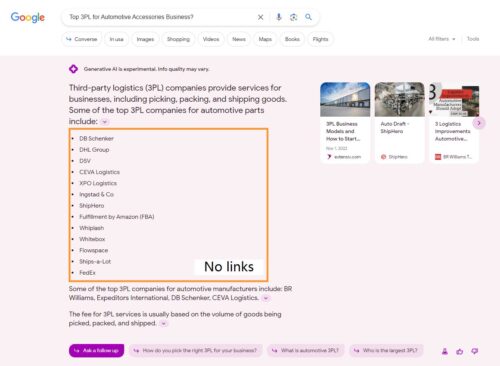The Long-Tail Answer Engine and Generative AI / SGE
Google’s Generative AI Search Results, also known as SGE (Search Generative Experience), represent its latest feature in the realm of Generative AI and conversational search engine results. At its core, the aim is to answer customer questions in the most effective way, ensuring Google retains its title as the “gateway to the Internet” amidst stiff competition from ChatGPT, Amazon, and Bing. While it’s grounded in the traditional Google search index, it’s enhanced with a Large Language Model (LLM) that offers a predictive and conversational interface. Interacting with it feels akin to chatting with a human.
For many website owners, this development implies that searchers might find their answers directly on Google, bypassing the need to click through search results. This could lead to a significant drop in organic click traffic. Estimates from September 2023 suggest that anywhere from 20 to 80% of organic search traffic might be replaced by on-page results.
Beyond Frequently Asked Questions (FAQ) into SGE
Insights into how SGE will be integrated into Google can be gleaned from its recent updates. As of now, Google has discontinued the Q&A section of its results, which used to appear below the standard results. This popular feature’s removal suggests its replacement by SGE. Additionally, Google has significantly revamped its algorithm to prioritize content helpfulness and author credibility.
To excel in SGE, firms should focus on populating their websites with Subject Matter Expertise (SME) content. Publishing branded Q&A content in Knowledge Bases, making it accessible to LLMs and linking it to a particular brand, could be a potent strategy. Strengthening this association further, internal linking structures can be used to form topical clusters from this Q&A content.
Q&A Knowledge Bases (KBSEO) and Extended LLMs
Many companies possess private knowledge bases with content stored across various systems, making it challenging to access. Employing LLM systems to process, categorize, and showcase this content as part of a brand’s online presence seems like a prudent move for many businesses. This content can be presented as generative website material or as search tools that adapt based on user navigation.
Notably, this aligns with our previous advice (from 2005-2022) about making knowledge bases accessible in libraries for easy indexing by search engines.


